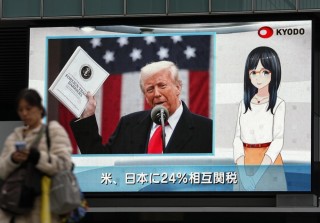Loading
Search
▼ Trump Tariffs May Push Down Japan's Economic Growth By Up To About 2%
- Category:Other
U.S. President Donald Trump's substantially higher tariffs, including those on all car imports, are set to slow export-oriented Japan's annual economic expansion by up to around 2 percent in the coming years, analysts warned.
Concerns are mounting that Asia's second-biggest economy, which has already been sluggish due in part to sharp inflation, could slip into recession if a downturn in exports stemming from U.S. tariff hikes weighs on corporate performance and hinders wage growth.
Takahide Kiuchi, executive economist at the Nomura Research Institute, estimates that the U.S. tariffs could push down Japan's gross domestic product by over 0.7 percent over roughly a year, urging vigilance against a possible recession.
Daiwa Institute of Research said Thursday that the reciprocal tariffs announced by the United States are projected to drag down Japan's inflation-adjusted GDP by about 1.8 percent in 2029, the year Trump is scheduled to leave the White House.
Trump, who started his nonconsecutive second term on Jan. 20, imposed 25 percent tariffs on all steel and aluminum imports in March and began applying an additional 25 percent levy on all automobiles produced outside the United States.
On Wednesday, Trump said he will slap a minimum 10 percent reciprocal tariff on all exports to the United States and further duties on Japan, home to Toyota Motor Corp and Honda Motor Co, and other selected countries, which face higher rates.
Trump's car tariffs would have a particularly huge impact on Japan, as the auto industry, its core business, has been a major driver of the broader economy. The United States remains the top market for Japan's carmakers working with many subcontractors at home.
More than 1.3 million vehicles were shipped to the United States in 2024, the Japanese government said. The volume accounted for 28.3 percent of Japan's total exports, the highest share among all items to the world's largest economy.
Business confidence among major Japanese manufacturers, however, deteriorated in March for the first time in a year, the Bank of Japan's quarterly Tankan survey showed earlier this month, as Trump's tariffs have blurred the outlook for the global economy.
The heavier tariffs by the United States come at a time when Japan is at a juncture where the pace of wage growth could outpace that of price hikes -- a goal sought by the government and the central bank, which have strived to combat decades-long deflation.
Last year, domestic companies agreed to wage increases averaging 5.28 percent at annual negotiations with labor unions, marking the sharpest gain in more than 30 years, while Japan's core consumer prices rose 3.1 percent in 2023, the fastest climb in 41 years.
In the latest shunto spring talks, firms offered average pay raises that reached 5.42 percent above the previous year's level, according to the Japanese Trade Union Confederation's interim survey, indicating a second straight yearly rise exceeding 5 percent.
The BOJ, meanwhile, has expressed eagerness to continue tightening its monetary policy to prevent inflation from hurting the economy. In January, the bank lifted short-term interest rates to 0.5 percent, the highest level seen in 17 years, from about 0.25 percent.
Nevertheless, economists said achieving wage growth that can surpass inflation remains challenging, as many companies, affected by the upturn in global raw material prices and the yen's depreciation, cannot afford to spend on human resources.
In addition, the Japanese government hopes that wage expansion will spread to small and medium-sized firms, which employ around 70 percent of the nation's workforce, but the U.S. tariffs and their side effects could pour cold water on the trend, they added.
Shinichiro Kobayashi, principal economist at Mitsubishi UFJ Research and Consulting, said that escalating trade frictions triggered by the U.S. tariffs could hamper business activities across the board, describing it as the "worst-case scenario."
"If the world economy decelerates, Japan's exports would decline, with repercussions for the domestic economy," such as reductions in capital spending, another key component of GDP, Kobayashi said.
Japan's GDP expanded an annualized real 2.2 percent in the October-December quarter, posting a third consecutive quarter of growth. An economy is technically considered in a recession if it contracts for two straight quarters.
- April 4, 2025
- Comment (0)
- Trackback(0)


